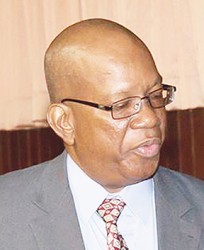VAT will not be cut this year as had been promised by APNU+AFC, the biggest miss so far in the 100-day agenda that it had laid out, but Finance Minister Winston Jordan yesterday assured that the other monetary-related pledges will be kept.
The breaching of the promise to cut the 16% Value-Added Tax (VAT) will be seen as evidence of an overly optimistic agenda by the coalition and one that was not grounded in a careful study and Jordan himself referred to it at a pre-budget press conference at the Ministry of Finance. Budget day is Monday.
“…I will say, again, you cannot wake up one night and determine that you are going to fiddle with a tax that you heavily depend on without having the benefit of a substantial study on that tax telling you by how much you can remove it and how much you will lose and what new taxes if any you would need to put in place to recover what you are losing”, he told reporters. That, however, seemed to have been the method employed by APNU+AFC before entering the government.

While in opposition the two forces had said the 16% tax was too heavy a burden for citizens; APNU is on record as saying previously that the tax could be lowered to 10%, while the AFC had said it could be lowered to 12%. The APNU+AFC manifesto for the May 11th polls said the coalition would immediately implement a phased reduction of VAT and the removal of VAT from food and other essential items. The first major sign that the administration would backpedal on its promise to cut VAT –the single most important contributor to government revenue–came when President David Granger addressed the opening of the 11th Parliament. At that point, he would only say that VAT would not be increased but said nothing about a lowering of the rate or its removal on essential items as had been pledged.
Jordan, in an interview with Stabroek News on May 21st, had not signalled that there would be a problem with adjusting VAT. He had said then that promises made by the coalition are not “an idle boast… they are, in many cases, within the realm of possibility, of happening. I dare say, at least the point as it relates to the salary increase, the pension increase, the review of the VAT… I dare say those are promises that can be kept.”
He had, however, signaled in that interview that the annual increase in the VAT intake was occurring at a declining rate.
Yesterday, in his first press conference since he took up office, Jordan spoke about the leakage of VAT in response to a question.
“VAT is leaked out in any number of ways…legal ways which is when you continue to zero rate more and more items or when you continue to give concessions that include paying no VAT…,” he said, adding that it is also leaked out when people are not paying the proper VAT.
Speaking yesterday on the financing of the wage hike for public servants among other areas, Jordan said, “I would say only generally (that) any Minister of Finance and budgeteer, once he brings out a budget, would have had to assure himself of the sources of funding before he makes commitments on expenditure, so I can assure you that I have done so.”
While he made it clear from the outset that he would only be answering general questions on the budget, Jordan said that he has not included any new taxes or increases to existing taxes and later noted that government will be homing in on tax evasion as from this year onwards serious efforts at tax administration, particularly strengthening and enforcing, will be done.
According to Jordan, because of the compression of expenditure this year, “We don’t have the pressure of revenues that we would have had in a full year… the pressure on revenues are not there… when I tell you that we are going to tighten, it is as part of an effort to enforce the lock and better enforcement of the lock, it is not bringing in any taxes or so on it is having the GRA refocus its energies.”
Jordan also said, “I could let you (know) that the deficit is one of the lowest in recent history only because of the nature of our activities during the year, where expenditure was severely compressed in the first eight months… as a result the (deficit to) GDP ratio is one of the smallest in recent history.”
Among the key features of coalition government’s proposed 100-day plan are a reduction in the Berbice Bridge toll, “significant salary increases” for government workers, including nurses, teachers, security personnel and civil servants on the traditional payroll and a “significant increase” in old age pensions.
Apart from VAT, the coalition government has also had to amend its plans in relation to the Berbice Bridge toll. From a promise to negotiate a reduction in the toll with the Berbice Bridge Company Incorporated, the government has announced that a subsidy will be paid to the company to facilitate the reduction. This in essence means that taxpayers will be funding the reduction of the toll.
Jordan also said that any concessions to miners will only be within the framework of the 100-day agenda. “There is something on the hundred-day agenda for miners and I am saying in respect of miners only this that is being given to miners is what was promised in the hundred-day agenda,” he noted.
In the 100-day plan and the coalition’s manifesto, it was promised that there will be a waiving of duties on fuel, tools and small-scale mining equipment bought by identifiable holders of small mining concessions.




